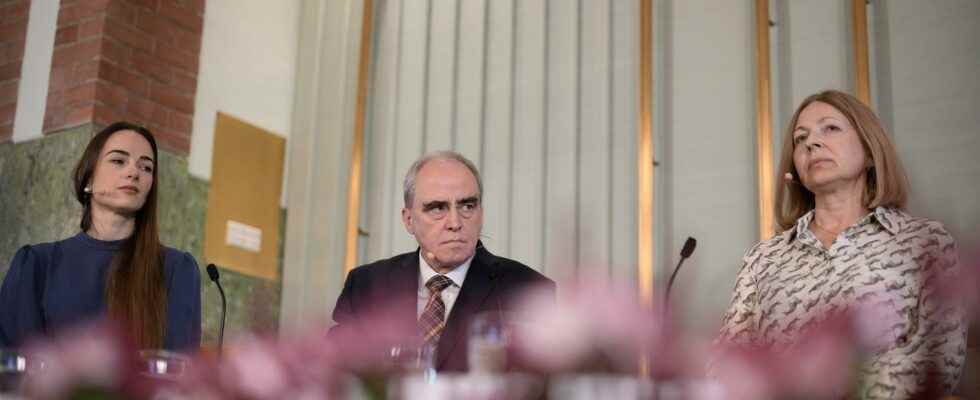Published: Less than 20 min ago
An “insane and criminal” invasion. This is how Vladimir Putin’s war in Ukraine was described when the three peace prize winners from Russia, Ukraine and Belarus jointly received the Nobel Peace Prize.
The imprisoned democracy profiler Ales Byalyatski from Belarus, the Russian human rights organization Memorial and the Ukrainian Center for civil liberties (CCL) share the peace prize this year.
One thing is clear: the prestigious award has not made the laureates lie down, on the contrary.
– The people of Ukraine want peace more than anyone else in the whole world. But peace cannot be achieved if a country under attack lays down its weapons, says Oleksandra Matvijtjuk, leader of CCL, on the spot in Oslo City Hall on Saturday.
Since the Russian invasion in February, CCL has documented over 24,000 war crimes.
International Tribunal
Oleksandra Matviytyuk also took the opportunity to repeat her call for an international tribunal to be set up to prosecute Putin, Lukashenko and “other war criminals”.
As a result of Russia’s extensive bombing of Ukraine’s energy infrastructure, Matviytyuk was forced to write his acceptance speech sitting by a candle
Her staunch opposition to the Russian regime is shared by Memorial’s chairman, Jan Ratjnskij, who denounced Russia’s “imperialist ambitions”, which he believes are a legacy of the Soviet Union that “thrives to this day”.
Currently, “opposition to Russia is called fascism,” which “has become the ideological justification for the insane and criminal war of aggression against Ukraine,” he says.
Memorial, which partly documents repression during the Soviet era, partly works with human rights crimes committed in today’s Russia, grew after the collapse of the Soviet Union through hundreds of local initiatives. The organization is banned in the home country.
The wife received the award
The third laureate, the Belarusian Ales Byalyatski, who founded the organization Vyasna in 1996, has been detained since July last year and has not been allowed by the regime to deliver his speech. Instead, the award will be received by his wife, Natalja Pintjuk.
She called for a fight against “dictatorships throughout the world”. According to her, with his war, Putin wants to create a “dictatorship that is dependent” on Russia.
– Of the same type that prevails today in Belarus, where the voice of the oppressed people is ignored and disregarded, she says.
Facts
Vyasna
Vjasna (Belarusian for spring) is an organization that works for civil and human rights. It was founded in 1996, in the context of pro-democracy demonstrations that took place when Aleksandr Lukashenko extended his presidential powers via a contested referendum.
Vjasna’s founder and chairman Ales Byaljatski was sentenced in 2011 to four and a half years in prison for alleged tax crimes. The sentence was condemned internationally as political and Byalyatski was released after three years. He subsequently received a number of international human rights awards and recognitions. He has previously been nominated for the Nobel Peace Prize several times.
Since last year, he has been imprisoned again, for alleged tax crimes.
The organization is headquartered in Minsk and has several regional offices in Belarus. It has international collaborations with 14 organizations, some of which are Swedish: Civil rights defenders (formerly the Swedish Helsinki Committee), Swedish Peace and Amnesty’s Swedish branch.
Read moreFacts
Memorial
The organization Memorial has been classified as a “foreign agent” in Russia. It has also been forced to dissolve completely.
The law on “foreign agents” was established in 2012 and was extended in 2017 to also apply to media organizations. Companies and organizations can be classified as “foreign agents” if they receive money from abroad and a single money transfer can be enough.
Those who are classified by a court as “foreign agents” must mention this in all their communications and in their publications, including online. Very strict accounting requirements are also placed on them, which in practice can be difficult to live up to.
Private individuals can also be classified as “foreign agents”, which means that all, even private, transactions and payments must be reported to the authorities at least four times a year.
If the regulations are not followed, the companies risk fines. The websites of organizations and companies can also be blocked in Russia.
Read moreFacts
Oleksandra Matvijtyuk
Oleksandra Matvijtyuk was born in 1983 in Boyarka in the Kiev region, in the then Soviet Republic of the Ukrainian SSR.
As a newly graduated lawyer, she started working for the then newly started organization Center for civil liberties (CCL), which she leads today. In the early years, CCL focused on legislation aimed at making Ukraine more democratic and increasing popular influence over the country’s judicial and police systems. During the Euromaidan protests of 2013–2014, which led to the ouster of then-President Viktor Yanukovych, CCL assisted arrested protesters with legal support and documented abuses committed by Yanukovych’s security forces.
After Russia’s annexation of Crimea in 2014, CCL began documenting cases of political persecution in the Crimean peninsula and crimes committed by the Russian-backed separatists in Donetsk and Luhansk. Work on documenting war crimes intensified after Russia’s large-scale invasion of Ukraine on February 24 this year.
In September, Oleksandra Matvijtyuk and the Center for civil liberties were awarded the 2022 Right Livelihood Prize. In October, it was announced that CCL, together with the Russian organization Memorial and the Belarusian democracy profile Ales Byalyatski, will also be awarded the Nobel Peace Prize in 2022.
The Swedish aid agency Sida has supported CCL since 2018. Between 2018 and 2020, a total of SEK 722,400 was paid out in Sida support. During the period 2021–2024, it is intended that a total of SEK 6.6 million will go from Sida to CCL.
Read more
